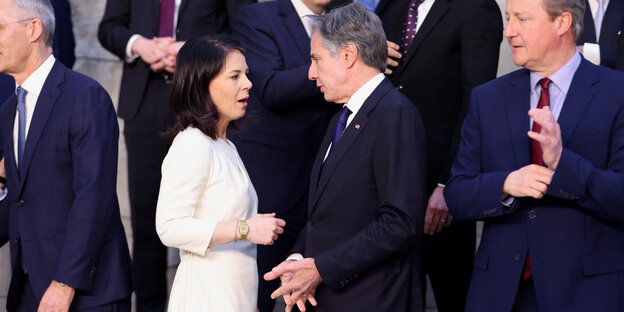In its anniversary year, the defense alliance must prepare for two horrific scenarios: major losses in Ukraine and Donald Trump.

Birthday group photo: German Foreign Minister Annalena Baerbock speaks with US Secretary of State Antony Blinken Photo: Johanna Geron/Reuters
BRUSSELS taz | The champagne was cold and the hymns of praise were ready. The foreign ministers of the 32 allies wanted to celebrate 75 years of NATO at their spring meeting in Brussels. After all, the military alliance is “the most powerful and successful alliance in history,” explained NATO Secretary General Jens Stoltenberg. Foreign Minister Annalena Baerbock spoke of a “security anchor” between East and West.
But Baerbock and Stoltenberg did not want to celebrate on Wednesday, quite the opposite. What they said at the beginning of their two-day meeting in Brussels sounded more like a preparation for dark times. There was even a touch of panic in the air.
Because in its anniversary year, NATO has to prepare for two long-suppressed worst-case scenarios: a long and costly war in Ukraine and the re-election of Donald Trump as president of the United States.
Insiders had already demanded that NATO become “Trump-proof” before the meeting began. Recently, the Republican has moderated his rhetoric somewhat and has no longer threatened to withdraw US protection from European allies who have “defaulted.”
Stoltenberg proposes 100 billion fund for Ukraine
Still, many at NATO headquarters in Brussels fear that Trump could question aid to Ukraine and block military support after his re-election. That is why they want weapons shipments to kyiv to be coordinated by NATO itself in the future. It is “a more robust and institutionalized framework” for long-term commitment, Stoltenberg explained. Until now, the United States has organized military aid within the framework of the so-called Ramstein format.
Stoltenberg also wants to take precautions when it comes to money. According to NATO diplomats, he proposes an aid fund for Ukraine of up to 100 billion euros over five years. This is “fresh money” for “many years,” Stoltenberg confirmed, without mentioning Trump's name. The allied war fund could become necessary if Trump eventually cuts off Ukraine's money supply.
Republicans in the US Congress are already blocking billions in aid promised by US President Joe Biden. Without urgently needed American help, Ukrainian troops would have to withdraw and leave the countryside to Russian occupiers, President Volodymyr Zelenskyj said in an interview with Washington Post warned. This would be a debacle for NATO, which is more involved than ever in Ukraine and has even promised kyiv's accession. After the withdrawal from Afghanistan, the most powerful military alliance in the world would once again lose prestige.
Hungary warns of “new escalations”
Polish Foreign Minister Radoslaw Sikorski said he supported Stoltenberg's plans. Canadian Foreign Minister Melanie Joly welcomed “any form of support that Ukraine can receive.” On the other hand, harsh tones came from Budapest. “Hungary will not support NATO proposals that bring the alliance closer to war,” Foreign Minister Peter Szijjarto wrote on Facebook. He warned of a “further escalation” with Russia if it takes an “offensive” role in the war.
Baerbock highlighted the comparatively high German contributions, but otherwise kept a low profile. It is “absolutely clear that we have to make more payments,” said the Greens politician. But he doesn't think it makes sense to “juggle” numbers of this magnitude.
No decisions were yet expected in Brussels. If a deal is reached, they should not be presented until NATO's anniversary summit in July in Washington.